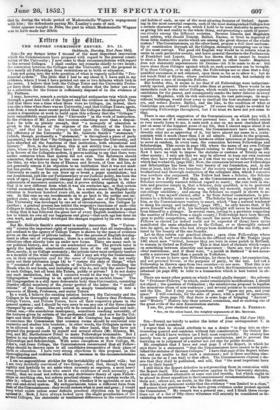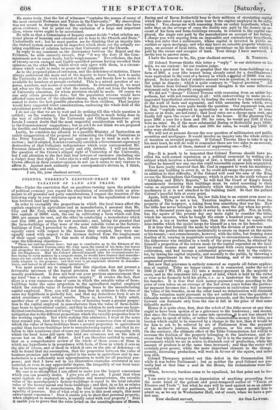I regret that he should attribute to me a desire
" to drag into an elec- tioneering quarrel and condemn without fair consideration" the Oxford Re- port ; of which I have written (as I feel) most respectfully. My anxiety has merely been to guard against precipitate conclusions, and to prevent the hurrying on to judgment of a matter not yet ripe for public decision. He complains that I have not read page 2 of the Report, in which he says there is a statement "that the Commissioners have caused to be pub- lished. the statutes of thirteen Colleges." I have that page of the Report before me, and am unable to find such a statement; nor is there anything else- where (so far as I can find) to that effect. The Commissioners express a de- sire that they shall be published, and add, that "the most important have come to their hands." I still think the Report defective in not presenting them in connexion with the Report itself. The same observation applies to the University statutes, which are doubtless attainable at some cost and trouble, but which ought to be placed in direct apposition to the Commissioners recommendations. I have them not; others are, no doubt, in the like situation.
He thinks my statement unfair that the evidence " was limited to a class," and names three gentlemen " who have given evidence under protest against the Commission." My remark was a general one ; and I think three excep- tions out of a list of fifty-three witnesses will scarcely be considered as in- validating its correctness. He states truly, that the list of witnesses "contains the names of many of the most eminent Professors and Tutors in the University." My observation was not meant to derogate from the credit due to the gentlemen who have given evidence ; but to point out the exclusion of a large and important -class, whose views ought to be ascertained. He tells us that a Commission of Inquiry cannot decide "what relation na- tional places of learnidg and education are to bear to the Church and State." Undoubtedly not ; but he must pardon me for thinking that an inquiry into the Oxford system must needs be imperfect which shuts out the actually ex- isting conditions of relation between that University and the Church. In reply to my comment on,the discrepancy between the Report and the Evidence, he adds correctly enough, that " it was the duty of the Com- missioners not to count heads, but to weigh reasons." Nevertheless, the fact of twenty-seven eminent and highly-qualified persons having recorded their opinions on the other tide, whilst seven only agree with them, is a circum- stance which ought to make us pause in our Judgment As to the proposed plans of extension, and the deficiency of statistics, Ihave always understood the main end of the inquiry to have been, how to make the University do the work required at its hands, and herein how to make it available for numbers at present excluded. This is a mixed question of ex- pense, numbers, and means of accommodation. In determining it, we must ask what are the classes, and what the numbers, shut out from the benefits of University education, for whom provision should be made. Of course we can only attain proximate data; but the population returns would have afforded some notion of the educated classes, who might reasonably be pre- sumed to desire the best possible education for their children. That inquiry would have suggested wider considerations, embracing the whole field of the educational power of the nation.
I do not say that we are to wait and do nothing till this whole question is settled ; on the contrary, I look forward hopefully to much being done in the way of self-reform by the University and Colleges themselves : and herein I cannot doubt that the most respectful consideration will be given to the Commissioners' suggestions ; but as yet I do not think we are prepared for forcible and fundamental changes of principle.
Lastly, he considers my allusion to a possible Ministry of Instruction an unfair exaggeration of the proposal for submitting the College Visitations to the Privy Council. That proposal appears to me to tend in such a di- rection ; and if adopted, it must eventually establish a Government supremacy destructive of that Collegiate independence which your correspondent Mr. Freeman (himself a witness) so justly and ably defends. I will not discuss the question of the Crown's alleged right of Visitorship of the University, but I call attention to the fact that four lawyers of eminence (including one a Judge) deny that right. I refer also to a still more significant fact, that the Crown officers in their counter-opinion do not (as it seems to me) venture to affirm it. Against such authority your correspondent's dictum is, I think, -somewhat hasty and rash. I am, Sir, your obedient servant, Z.



























 Previous page
Previous page